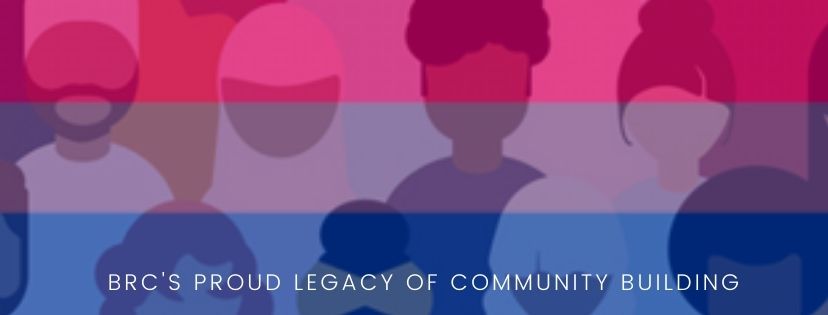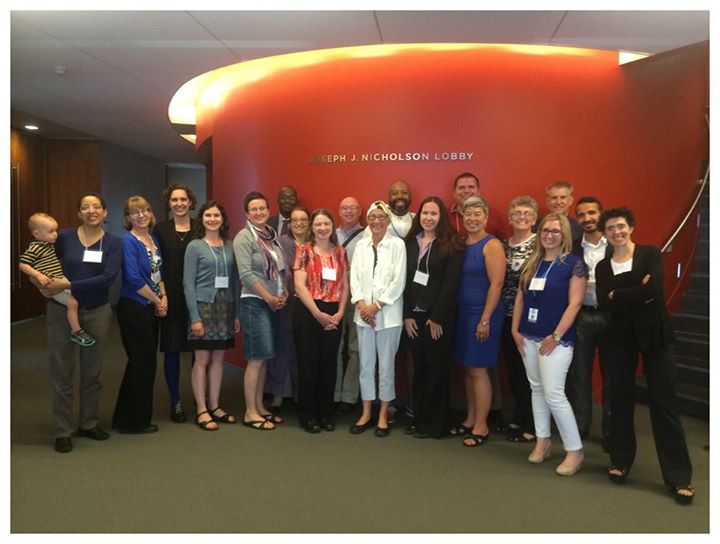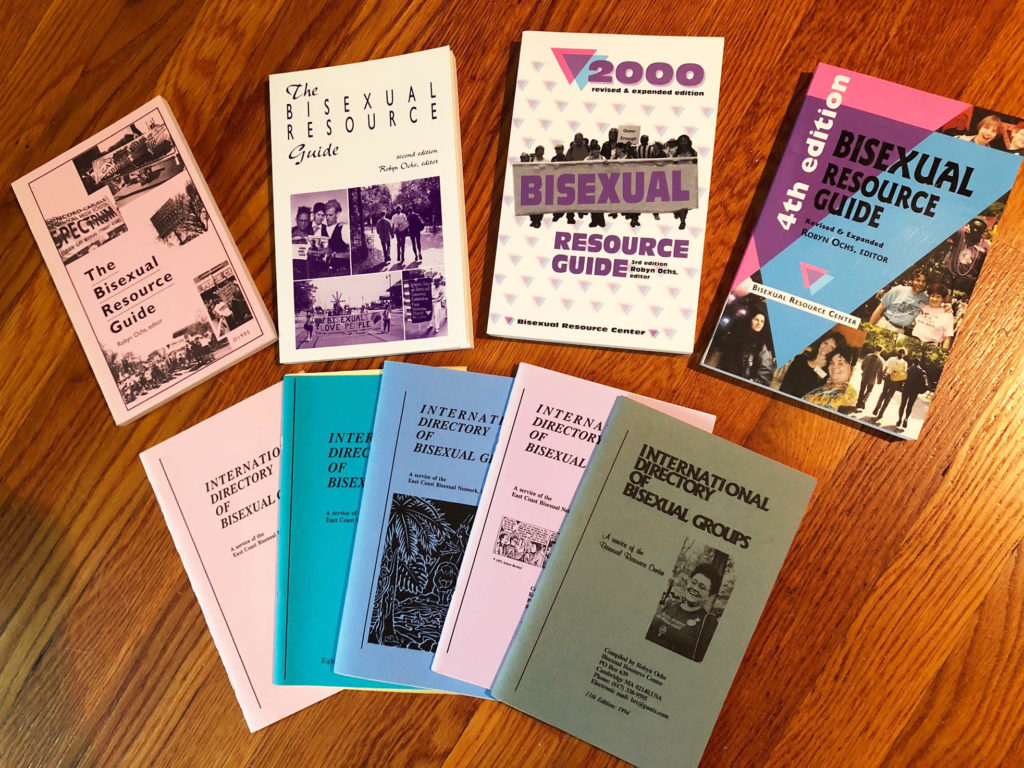
By Ellyn Ruthstrom
2020 is the Bisexual Resource Center’s 35th year, so #BiWeek is the perfect time to take a look back at what the BRC has accomplished as the oldest bi-specific national organization in the U.S. Though the B has been a part of the LGBTQ acronym since the late 80s, the truth is that most organizations that claim to include bisexuals have no programs or services that target the bi+ community. Bi-focused organizations have struggled for decades to provide support, services, and a sense of connection to our community, and the BRC has been instrumental in creating longstanding resources, services, and a political presence for bi voices locally and nationally.
Initially named the East Coast Bisexual Network (ECBN) after it was conceived at a bisexual conference in 1985, the organization quickly evolved into one that provided resources and services to bi+ folks across the country. For many years, the organization’s phoneline was a lifeline for those who didn’t have any bi+ groups in their area. Still to this day, the BRC fields calls from coast-to-coast and helps to connect people to a variety of support services and to simply lend an empathetic ear. All the while, it has also nurtured one of the most vibrant local bi+ communities in the country, with support groups and social groups that provide a variety of ways for bi+ folks to connect and create community. Even now, during the pandemic, the groups have pivoted to online meetings to ensure that folks who need support can find it.
One of the first resources the BRC developed and distributed was the International Directory of Bisexual Groups that was initiated in 1986 by Robyn Ochs with eight pages of organizations and contact information of bi groups around the world. Ochs noted “Pre-internet, we strongly needed such a resource to find support for ourselves and to give us a sense of a worldwide community. It was an extensive grassroots endeavor with volunteers across the U.S. and in several other countries serving as regional editors.” The directory was published 11 times, growing each time, and in 1995 it became the Bisexual Resource Guide and included photos, cartoons, and eventually articles and other resources. The final print edition was published in 2001 as the BRC was able to provide the information online after that.
The BRC has also had an important role within the LGBTQ+ political arena within Massachusetts and worked on a number of campaigns over the years. Most notably, the BRC was part of the coalition of groups that worked to bring marriage equality to Massachusetts in 2004, the first state to do so. BRC has also linked up with other bi+ groups to draw attention to bi-specific campaigns as well as with other LGBTQ+ organizations on larger community issues nationwide and internationally.
Using the annual Creating Change Conference, sponsored by the National LGBTQ Task Force, as a gathering place to connect with bi+ organizations and individuals, the BRC and other groups led actions to protest bi-erasure and bi invisibility within the conference itself as well as within the larger LGBTQ+ movement. For many years, there would be few bi-specific workshops approved and countless LGBTQ+ panels that did not include bi+ speakers. However, Creating Change was also the space where bi+ leaders presented all-day institutes and caucuses that provided opportunities for deeper community discussions, brainstorming, and networking.
After meeting with the Obama Administration’s LGBTQ community liaison, Gautum Raghavan, at the 2012 Creating Change conference, the BRC co-organized the first White House Roundtable on Bisexual Issues in 2013. That meeting opened up a new dialogue with several agencies in the administration as well as sparking the BRC to initiate Bisexual Health Awareness Month in March 2014, which has turned into a much-needed yearly recognition of our community’s needs and amazing resilience. The BRC’s focus on health disparities for the bisexual community also caught Judy Bradford’s attention at The Fenway Institute and the BRC co-sponsored the first gathering in Boston of what would become the Bisexual Research Collaborative on Health (BiRCH).
I have been part of the Boston bi+ community for over 25 years, and served as President of the BRC for ten of those years. Bi-specific organizations are incredibly under-resourced and receive very little foundation support. The leaders of the various bi+ organizations across the country often struggle with burnout and high levels of stress trying to provide programs and services to a community that experiences extreme physical and mental health disparities. Something that I was very proud of initiating as BRC President was the Bisexual Leadership Roundtable (BLR), which was meant to provide a support space for bi+ leaders as we worked within our individual communities as well as to nurture networking and collaboration between the organizations.
I believe it was the synergy of those BLR meetings that established the groundwork for the important White House meetings and other collaborative projects between organizations. Though the initial BLR has disbanded, the great thing is that another networking space has opened up to keep bi+ leaders aware of community events and initiatives, as well as a personal sounding board.
The international community has now had over 20 years of marking Celebrate Bisexuality Day, affectionately called CBD by many of us. Over those years, CBD events in Boston have included bi+ health events, book readings, films, HIV/AIDS awareness, dance parties, drag and spoken word performances, and forums. Every year, the BRC presents the Unsung Hero Awards to honor the volunteers who put their time and creative spirits into building and supporting bi+ community. It takes a bi-tastic village to keep this organization moving forward.
There are some amazing individuals and organizations that improve life for bi+ community members through their work and receive very little attention or thanks for what they do. During #BiWeek, I celebrate the BRC for its proud legacy of community building and I celebrate all of the other organizations that are working within this challenging time serving bi+ people and creating supportive spaces for all of us. Building bi+ community saves lives.
Ellyn Ruthstrom is the Executive Director of SpeakOUT Boston, the oldest LGBTQ+ speakers bureau in the nation, founded in 1972. She has been an out bisexual leader for over 20 years, was President of the Bisexual Resource Center for ten years, and co-organized the first White House Roundtable on Bisexual Issues in 2013.

